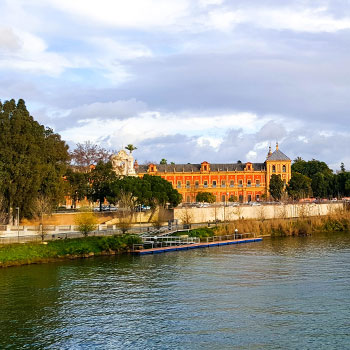Nutrition in Exercise and Sports
Liberal Arts & Spanish Culture Program
Seville, Spain
Dates: 5/22/25 - 6/21/25

Nutrition in Exercise and Sports
OVERVIEW
CEA CAPA Partner Institution: CEA CAPA Seville Center
Location: Seville, Spain
Primary Subject Area: Nutrition
Instruction in: English
Course Code: NUTR320SVQ
Transcript Source: University of New Haven
Course Details: Level 300
Recommended Semester Credits: 3
Contact Hours: 45
Prerequisites: This course is designed for students majoring in Nutrition/Dietetics, Exercise Science/Kinesiology, or Athletic Training who have a foundational understanding of the biological sciences.
DESCRIPTION
This experiential course encompasses the nutrition parameters and strategies that are essential for maximum athletic performance of resistance and endurance athletes grounded in the most current evidence-based scientific literature. Course topics include, but are not limited to, basic concepts of exercise physiology and energy metabolism, energy nutrients, vitamins and minerals, intervention planning, principles of balanced diets, timing and composition of intakes for pre- and post-activity meals/snacks, hydration and electrolyte maintenance and replacement, weight management strategies, and nutritional needs for special situations and various athletic groups. Vegetarian, vegan, and other popular plant-centered diets are explored for their potential benefit in athletic performance. Evaluation of dietary supplements and ergogenic aids will also be discussed.
Particular attention will also be given to the Mediterranean diet, with a focus on selected food products and their cultural appropriateness to the region as well as, how they relate to sports nutrition and athletic performance. Students will also have the opportunity to taste a representative sample of Mediterranean diet foods in a structured environment in which students put into practice skills and knowledge discussed in readings and lectures.
Students will participate in experiential activities throughout the course, with the intention of exploring the realm of Exercise and Sports Nutrition as it relates to local food practices and their physiological effects upon the human body. Structured exercises should ultimately broaden student knowledge of the relationship between food consumption and athletic performance as well as, develop the critical capacity to assess important features of various food practices.
Particular attention will also be given to the Mediterranean diet, with a focus on selected food products and their cultural appropriateness to the region as well as, how they relate to sports nutrition and athletic performance. Students will also have the opportunity to taste a representative sample of Mediterranean diet foods in a structured environment in which students put into practice skills and knowledge discussed in readings and lectures.
Students will participate in experiential activities throughout the course, with the intention of exploring the realm of Exercise and Sports Nutrition as it relates to local food practices and their physiological effects upon the human body. Structured exercises should ultimately broaden student knowledge of the relationship between food consumption and athletic performance as well as, develop the critical capacity to assess important features of various food practices.







